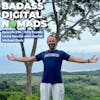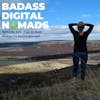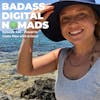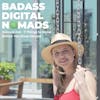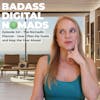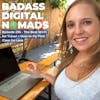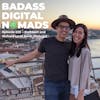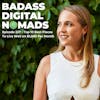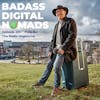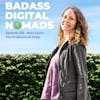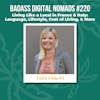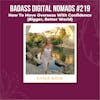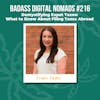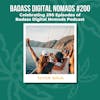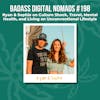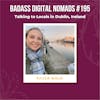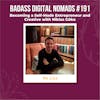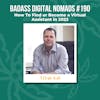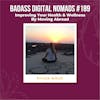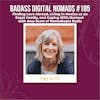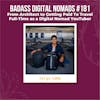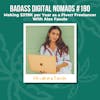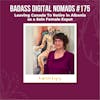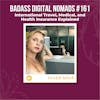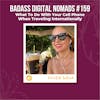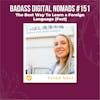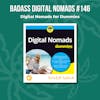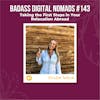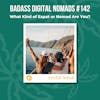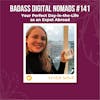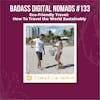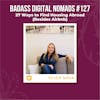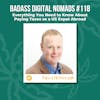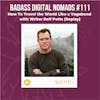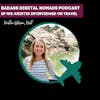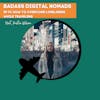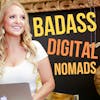Retiring at 40 to Travel Full-Time with the "King" of Digital Nomads
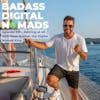
Interested in building wealth and retiring early? Learn how from long-time traveler, Dean Kuchel, who achieved financial independence and retired at the age of 40.
Interested in building wealth and retiring early? Learn how from long-time traveler, Dean Kuchel, who achieved financial independence and retired at the age of 40.
The self-proclaimed “King of Digital Nomads” has been working remotely from 100+ countries for the past 10 years, empowering others to pursue a location independent lifestyle.
You’ll learn Dean’s beginner-friendly tips and tactics for achieving financial freedom before the typical retirement age. He reveals his mindful approach to saving money, investing, and building sustainable wealth. (It’s simpler than you think!)
Plus, Dean and Kristin discuss digital nomad gentrification, global citizenship, minimalism, and their visions for the future of remote work. This is a juicy one, so tune in and share it with a friend who might enjoy it!
Special Offers:
- Get a new laptop bag, travel backpack, or carry-on at Minaal.
- Pack light with Unbound Merino wool clothing, Kristin’s favorite!
- Subscribe to Kristin's weekly e-mail list
Topics Discussed:
- Becoming who you want to be.
- Achieving financial independence as a full-time traveler.
- Money mindset.
- How to retire early.
- Investment strategies for growing your net worth and building long-term wealth.
- Changing your mindset around social status and consumption.
- Minimalism: The most important part of financial independence?
- Carry-on only travel.
- Being a responsible tourist, traveler, and global citizen.
- Digital Nomad Gentrification: Is it a problem or overblown?
- Digital Nomad Visas.
- Why Dean created the Digital Nomad Israel community.
- The future of remote work and digital nomadism.
- Quitting bad habits and addictions, like sugar.
- Top resources for learning about money and investing.
Questions Answered:
- How did you become “The King of Digital Nomads”?
- How do you become financially independent by age 40?
- How do you build your net worth and increase your ROI?
- Is traveling the world cheaper than staying in your home country?
- What does it mean to be a responsible traveler?
- How is remote work a solution for global, social, and economic issues?
- Is there any country you don’t feel at home in?
- What challenges do you encounter as a full-time digital nomad?
- What resources do you recommend for learning about financial freedom?
- and more!
Episode Resources:
Related Videos:
- 15 Remote Jobs That Pay $100K+ per Year
- How To Become a Digital Nomad: The Top 5 Ways
- Asking 10 Digital Nomads How They Make Money Online from an Island
- What I Spend In a Month as an American in the UK
- Pack Like a Pro: Uncover My Secrets From 20 Years of Travel
- Why I Left the USA for UK 🇬🇧
- Travel To Portugal with Kristin Wilson in 2024! 🇵🇹
- Underrated Eastern European Destinations
Related Podcasts:
- Ep 175: Leaving Canada To Retire in Albania as a Solo Female Expat
- Ep 215: The Easy Way to Live a Better Life
- Ep 223: Slow Travel Tips from Nora Dunn, The Professional Hobo
- Ep 225: 118 Countries and Counting: Ageless Wisdom from a 58-Year-Old Digital Nomad
- Ep 233: Travel Hacking and Maximizing Your Credit Card Rewards with Travel AF
Financial Independence Podcasts:
- Shannon McClay’s Podcast: Martinis & Your Money
- Financially Naked
- Money Girl’s Quick and Dirty Tips for a Richer Life
- Financial Feminist with Tori Dunlap
- ChooseFi
- Bigger Pockets Money
Books/Articles Mentioned:
- 12 Ways the World Will Change When Everyone Works Remotely (Kristin on Medium)
- The Life-Changing Magic of Tidying Up by Marie Kondō
- Kick the Drink… Easily! by Jason Vale
- The Easy Way to Quit Caffeine by Allen Carr
- The Easy Way to a Better Sleep by Allen Carr
- Good Sugar Bad Sugar by Allen Carr
- Smart Phone Dumb Phone by Allen Carr
- You Are a Badass at Making Money by Jen Sincero
Other Digital Nomad Resources:
- Nomads Buenos Aires
- Nomads Giving Back
- Social App for Digital Nomads: Nomadago
Connect with Dean:
Connect with Kristin and Support the Show:
See the show notes pages on BadassDigitalNomads.com or TravelingwithKristin.com/podcast for time stamps, transcripts, and more resources from this episode.
Sneak Peek:
Dean: 00:00:00 There was an active volcano and there was the middle of the sea in Galapagos, and I was amazed that I have internet there and I could perform my work and then go and dive with sharks and see all the amazing nature. Yeah.
Introduction: Welcome to Badass Digital Nomads, where we're pushing the boundaries of remote work and travel, all while staying grounded with a little bit of old school philosophy, self-development, and business advice from our guests.
Kristin Wilson, Host: 00:00:33 Hey there, Kristin, from Traveling with Kristin here and welcome to episode 237 of Badass Digital Nomads. My guest today almost needs no introduction because he is Dean Kuchel, who is also known as the King of Digital Nomads. Now, Dean has been working remotely from over a hundred countries for the last 10 years before he even knew what a digital nomad was. And he has been empowering people to choose a freedom filled location, independent lifestyle through his Facebook group, through his keynote speeches and through his mentorship program. And it's so impressive what he's been doing, the projects he's been working in, and also how he has been able to achieve financial independence by the age of 40. So in today's episode, we're talking a lot about how he did that, some of the tactics that he used, his investment approach, and also his mindset to saving money and becoming financially free and how that has allowed him to travel around the world.
Kristin: 00:01:51 We also talk a lot about his travel strategy carry on only minimalism and more philosophical discussion around being a responsible traveler, a responsible tourist, a responsible global citizen, and how he sees the present and future of this location, independence, movement, and lifestyle.
Minaal
And now we're talking a lot about packing light and luggage on this conversation today. So I wanted to bring your attention to Minaal, which makes backpacks and carry-ons and travel accessories that are designed with world travelers in mind as we get close to the holidays here. I personally have had their Minaal Daily 3.0 bag since back in I believe 2019 or 2020. It's still holding up just like new. They also have their carry-on 3.0 bag, which has been designed and redesigned and been relentlessly tested for five years. And so you can check out their bags, get yourself or someone you love, a very valuable and very useful and very cool gift for the holidays.
Kristin: 00:03:20 And I will link to their products and also their travel accessories in the show notes with my referral link, one customer said, this is Al's best bag, yet the little details make all the difference. This person has the 1.0, the 2.0, and now the 3.0 and is loving all of the upgrades and hidden features that this bag has, especially the hidden passport pocket and all of the zippers and the perfect places. And also really the durability and the quality of these bags is what really impresses me. And I really like their open lay flat design. It's so convenient and it's also comfortable to wear. And I'm carrying this bag around with me almost 24/7.
Kristin: So I hope you enjoy this discussion with Dean. It's always great to talk with people that have a decade or more of experience in the lifestyle because you don't just get the kind of glossier side of travel, but you also get, uh, some of the real side and the challenges. But also it's interesting to see how enthusiastic people can still be about this lifestyle after so many years and decades. And I found that here with Dean today. I also found that with my friend Nora Dunn, the Professional Hobo and many, many more I guests who we've had on the show. So without further ado, let's get into it for today and I will see you on the flip side.
Podcast Interview:
Kristin: 00:04:58 We have Dean Kuchel on the show today. Everyone, Welcome Dean, the King of Digital nomads. How did you get this title?
Dean: 00:05:09 Oh, wow. Good question. I love it. And yay, thank you for having me here. How did I get this title? The long answer is that it was given to me by a vlogger who talks all about, um, travel. And he had me on his show and he decided to call me the King of Digital Nomads. And then I thought about it and I said, Hmm, no one else claims for this title, so why not me? I'll be the king of digital nomads <laugh>. And I used it as a vehicle to prove a point that I've made time after time in my talks or working with with my students, that you can really be anything you want these days, right? You can claim to fame and not just, uh, as a joke as the king of digitals, but also professionally. If years ago in order to be a photographer or a content writer, you had to go to business school or photography school in New York or travel to some Ivy League, uh, college in, in the States, you no longer to do that. You can just say, Hey, I'm a photographer. You might not like my photos, but I'm a photographer. People can be concentrator without any accreditation. And that's what I wanted to, to prove to people that you can really be anything you want. Of course you need to be good and master your skills, and I'm trying to be a good as king as I can, but, um, it's really just to, it's a joke that made to prove a point, <laugh>, and now I'm stuck with this joke,
Kristin: 00:06:36 <laugh>. Cool. Well, I'll be the queen then. <laugh>, is there a queen of digital nomads out there?
Dean: 00:06:41 Uh, my girlfriend claims to, to this position, right?
Kristin: 00:06:44 <laugh>. No, Okay, well that's a different position. <laugh>,
Dean: 00:06:47 But it's a, yeah, up for grabs, really. Uh, and I really think people should feel about themself, whatever they want, and call themself whatever they want. And you know, I always joke that I'm a mo-- I'm a model and I'm a singer and maybe no one likes how I sing or no one really likes or pay me to, to do any modeling. But it doesn't make me less of a model or less of a singer. I'm a terrible singer.
Kristin: 00:07:12 I really like that because I think that if you want to be something in the world, there's a reason for it. And there's something in your brain or in your soul that is suggesting that you be that thing. Singing's a good one because it's, it can be difficult to sound good when you're singing, but many of us love music and love singing, and there's nothing wrong with that. And we do live in this world of the permissionless economy where you can declare yourself to be one, and then you can work to back it up with experience and expertise. And you can start with your hobbies, with, with your businesses. And I, I think that's something that also can be hard to come around to accepting that you can be the identity that you want to be. And that's something that I've struggled with as well, with calling myself a content creator, a videographer, a podcaster, a YouTuber, a dj.
Kristin: 00:08:11 These were all things that I couldn't associate myself with until I actually started doing the thing. And even then, it took me years to actually claim those titles of, okay, this is what I am, this is part of who I am, my identity. But I heard a great anecdote from Steven Pressfield, the famous writer that was on a podcast from, I believe it was 2014, and he said that one of his friends decided to become a golfer and she went out and bought all of the professional golf clothes, all of the gear. And she took it very seriously from the first day, even when she had no experience and was just a beginner. And she really embodied the idea of being a professional golfer before she actually was one. And she walked the talk and, and now she's, you know, very experienced and very good at golf. So what are your thoughts on that?
Dean: 00:09:08 I think this is really a big opportunity for so many people there, whether they already have a career or they're building their career. You don't, as you said, it's permissionless society now, and you can be whatever you want. And all these limiting belief that, oh, I need a diploma and I didn't study for it. And I, and I'm not saying that you shouldn't study or become professional at what I do, I really believe in professionalism. But it's okay to give yourself the title to carry this title and then build yourself up to be the person, the persona, and the, and the business that you, you wanna do and be. So that's just a, a calling. So people who hold themself, because I'm limiting beliefs, they have like, oh, I, I didn't get a diploma in content writing or graphic designer. And also, you don't need everyone to love you, right? Like you can be a, a graphic designer and you just need your 100, 200 clients, sometimes 20 clients to love you out of 8 billion people. And that's enough to, to make a business and living and, and be great at what you do
Kristin: 00:10:12 Completely, uh, focusing on a niche market and serving the clients that you have really well. And so let's go back a little bit to your background, because I read that you became financially independent by the age of 40. So how did you accomplish that?
Dean: 00:10:31 Uh, so I'm 41 now and I achieved financial independence about a year and a half ago, just before I turned 30, 40. And <laugh> in a nutshell, through hard work and not luck, um, sometimes people hear my story of world travel and I've traveled quite a bit and been working remotely for 10 years and nothing. I was born, I wasn't born into money. I didn't get extra luck from the gods or anything like that. And I didn't win the lottery. I really worked for many, many years. And I was very calculated with finances, right? I was keeping track of my expenses. I was making sure to, to save enough every month. And I invested my, my money to let it work for me. And I didn't have some crazy jobs that they paid me, extreme amount of money I had, I had a good job, decent jobs, but, uh, no exits or stock options or anything like that.
Dean: 00:11:28 And it was through a lot of planning and a mindset shift. 'cause I was making the same money 20 years ago as I was making 10 years ago, pretty much. And I just changed my mindset on what I spend my money on. And if 10 years ago I would spend my money on clothes, on brands, some expensive accessories, more of the show off and buying a status, a social status. That's what I stopped to do. I adopted minimalism as I started my, my digital nomad journey. It means that I, I consumed much less. It means that I met some short-term sacrifices for the first five years of my travel. I opted to, to stay in hostels, meaning I spent $10 to $20 a night. Instead, Airbnbs and hotels that cost me $50, $60 could cost me $50, $60 a night. And this $1 and $10 and $5 have accu accumulated, put 'em together, I started to invest them.
Dean: 00:12:26 And there's no magic here. This is what happened when you make a short term pain and sacrifices for the long term. And over time I found myself with a thousand dollars saving and then $5,000 and then $20,000 and then $50k. And I don't want to give the impression to people that I have an unlimited amount of money or some multimillionaire, not at all. My net worth is nothing crazy, but it's enough to sustain me. And it's also the calculation and understanding what kind of lifestyle I want. Most people I talk with about financial freedom and I ask 'em how much money you wanna have, they say $10 million. It's like, okay, why? And then, so it'll be, well, I want to just lay down on the beach, sleep on a cocktail and enjoy life. Say, okay, to do this, you don't need $10 million. It's enough to have $300,000 maybe or half a million, right?
Dean: 00:13:19 'cause you can do it in Thailand or in Sri Lanka or in Argentina and many other places. So when you start to think not just about the numbers, but what kind of lifestyle you want for yourself and what lifestyle I want for myself, what's important, what I value in life, all of a sudden I realize that financial freedom and financial independence are possible and not just some some crazy dream. So it's a journey and it's a process and it really requires some sacrifice in, in the short term. But now when I celebrate my financial independence, when I feel free to enjoy life the way I want, I I have more flexibility about the jobs I take and the projects I'm working on. I appreciate and I understand the price that I paid for, for a few years.
Kristin: 00:14:07 Yeah, I think it's worth it. Those short-term pain for long-term gain. And you can actually gamify it. So it's not actually painful. You can turn the concept of saving and investing into a goal and into a game, and it can be quite addictive. But what would you say are the investment vehicles that have been most successful for you as far as growing in net worth and providing a return?
Dean: 00:14:37 And before I answer that, I, I will add that throughout my process of becoming financially free, I didn't suffer, right? Yes. My, I gave up the, the fancy and comfortable hotel, but it didn't feel as a big sacrifice because it's not something that they, even today that I can afford it. I don't stay in expensive hotels because I don't appreciate, and I don't see the value of spending $300 to sleep five hours. And throughout this process, I also traveled to more than a hundred countries. I saw the world. I met people, I build my career. I, I built a community. I did a lot of amazing things during this times where I, I was a little bit more tight with my budget and I still operate under budget. So this journey definitely has a lot of rewards. And the beauty of the digital moment lifestyle for many of us is that traveling the world ended up being cheaper and more cost effective and supporting my financial goals rather than staying in my hometown in Tel Aviv because Tel Aviv is extremely expensive.
Dean: 00:15:36 So all of a sudden, if I go live in India for a few months and, and Spain and, and Colombia, I get to travel the world and I get to enhance my financial position. And in terms of investments, index funds, in the last, I think if you look back in history, they did pretty well. S&p 500 and Dow Johnson, others did pretty well, especially in the last 15 years. Were pretty good. So maybe I was lucky riding a wave, but that worked well. I had some alternative investments. I don't want to to drop any specific names 'cause I'm not in position to, to recommend anything. I don't have a license or anything. But, um, some alternative investments that most people will look at and will say, okay, this is crazy, or this is impossible, or this is the Ponzi scheme. I actually did my due diligence.
Dean: 00:16:27 I followed smarter people advice and more successful people than me, and I just copied what they did. I joined the right masterminds, I took mentors, and this is where I learned a lot of, about a lot of those investments. And if before I thought five, 6% return are amazing today, anything below 12 or 15, it's not even interesting. And the risk level is, is almost the same. I would say by far the best investments in terms of ROI and sounds a little bit like a cliche, it's knowledge and investing in myself, the life coach I took and worked with for over six months completely changed my life and helped me to boost my, my business, my confidence, my my feel good, my, my like relationship was enhanced as a result. Online courses that I bought, communities that I paid to be part of, I attended probably 20 different conferences for digital moments in the past two years.
Dean: 00:17:32 And in terms of not just friends that I met and people now I know in the fund I have, but also financially that helped me to make more money if it's public speaking engagements, if it's getting more students from my mentorship program, if it's learning about opportunities to, to invest in real estate, in stocks, in foreign exchange, anything. So people often afraid to buy into those courses and mentors and knowledge, and you do need to do your homework and, and find the right person and people for you. But this is by far the, the best ROI.
Kristin: 00:18:09 Yeah, I think it's bringing together these little seeds and points of information and tips from a wide range of sources. But at the end of the day, it's all about people. And it sounds like that's something that you're very passionate about. And talking about connection with people, everything traces back to people that you met, every opportunity, every experience, unless you're meditating in the woods. But yeah, when you look back at life, everything happened because of other people. And it's a balance in this lifestyle to be able to travel and meet people, but then also implement the things that you're learning or apply what you're learning. So how do you find that balance while traveling at admittedly a very fast pace?
Dean: 00:19:08 I travel for people, really, and I, I will double now on what you, you just spoke about. I'm the result of all the people I've, I've met in my life, right? Even the conversation with you and other conversation I had, whether it's one minute or one hour, or friends that I have for months and years affects me in some way. They install some new ideas in my head, they change my mind, they challenge my, my way of thinking. So everything I've done, I learned from someone like, let's be honest, I was born with empty box. I, so everything I know today, I learned from someone. All these ideas about remote work and financial freedom. And a big reason why I travel today is, is for people, is to meet and hang out with my friends, spend time with my family. It wasn't always the, the driver for my travels until I think two, three years ago I was traveling mostly to see the world and explore some far corners of, of our beautiful planet.
Dean: 00:20:03 But how do I balance it? I'm probably a bad example for someone who has some work-life balance. I don't like to sleep that much. I don't sleep that much. I just drove from France to Lithuania yesterday, 20 hours drive. I'm taking a flight to Barcelona tomorrow. I will be in Argentina in four days. So quite insane. But this is what I do. I'm a connector. I love to meet people. I live in a, a little bit of a formal state of mind. I think <laugh> so many things to attend. So I'm trying to, to catch them all. But I do take the time to just relax. Uh, you know, it could be maybe a retreat where I shut down my phone for a week. It could be just going on a romantic gateway with my, my girlfriend or a spending week with my, with my family. So I find the time, but I also must say that I love what I do. I'm really passionate about people and helping others to, to concur their, their dreams and achieve their goals. And it's part of my therapy to have a good one hour long conversation with, with someone who has this do attitude. It relies my fire.
Kristin: 00:21:13 So yeah, you sound very extroverted. I was interested in what you mentioned about changing your mindset around status and what you spending your money on before the pandemic. I wrote this article on Medium about how I thought the world would change when everyone works remotely. And a lot of those things happened during the pandemic. But one of the things that didn't happen yet that I expected to happen was that the way as humans, the way that we perceive status would change and also our desire to accumulate material goods would change. Because when you live an overseas lifestyle or a traveling lifestyle, you've mentioned on other podcasts, I feel at home wherever I am. So you kind of make your home where you go, it's not as important, you know, what type of coffee mugs you have or what kind of couch you have or whatever.
Kristin: 00:22:15 But it's also, there's no one to impress <laugh> there. When you grow up in the same place and you're in high school, there's all this pressure to fit in and then in the workplace dressing a certain way. But then when you travel and people don't know what you were wearing yesterday, or you don't have to look a certain way, act a certain way, it's no longer important to own a Mercedes or all of these other things that, you know, come about in our consumeristic society. How has that changed for you and do you think it's something that will begin to change on a, on a macro level? I, the only thing I think that has affected it or prevented it from happening so far is social media <laugh>, because whoever, what we used to show off in our communities, now it's showing off online, but that's another thing. So what are, what are your thoughts on that?
Dean: 00:23:11 Like you, I wish to, and I thought there will be a bigger change in terms of how we we consume and what we consume. And to be honest, uh, I came to realize that me and and, and you and other people who promote certain lifestyle, we, we all also promote something some way to consume travel and accommodation and flights. And we sell a certain dream very much like other companies that sell you maybe, uh, fashion, clothes, accessories, watches, cars, right? Say, Hey, buy this car, you'll be the coolest guy in the neighborhood. Buy this watch people think you are rich. And so a little bit, the digital nomad lifestyle is in a way the same kind of commercial. Not that we buy goods, we buy more experiences, but it's still, uh, an idea that we sell people. But for me, the big change happened I think about nine years ago when I was fairly early on my journey as a digital nomad.
Dean: 00:24:07 Before that I was living in, in the states, in New York, in San Francisco, states and countries where your look really define who you are. And living in New York, it was important to wear a suit and tie even if I didn't really need to and always have the, the latest sunglasses and what's cool for the season. And I would go to a bar and I would feel important because I would have all these accessories on me. But you come talk to me, I I have no story to tell you. What do you do? I work in some cubicle, some tech stuff, really boring, like probably couldn't have 10 minutes conversation top and nothing to share. And then around 2014, 15, I was in Nicaragua staying in a hostel, didn't shave for a week, a shirt that I was wearing probably for three days. Pants that I was wearing for wearing for five days.
Dean: 00:24:59 Shoes that I haven't changed for six months. And I looked like a backpacker that was backpacking and I was the most interesting guy at, at the bar. You would never think that I have a story that I'm interesting or anything, but you'll talk to me and I can already tell you a story about 30 countries that I traveled the same year, active volcanoes that I hikes, sharks that I dove with and and whatnot. So I understood that it's really not what I put on myself, not the costume that I choose to wear in order to impress people and who I am as a person is so much more important. And this is, this changed a lot of things for me and going to coworking spaces and you see people wearing the same black T-shirt and flip flops, and they don't care to impress anyone because they feel good in their own skin and their own life.
Dean: 00:25:50 And what they do, they feel accomplished. And this is what mostly changed for me. It's like, I love my life. I love what I do it, I don't care what people think of me. And so that I don't care, but it's, that's not gonna change my day or not gonna change my, my behavior. And if I dress nicely, I do it for myself. Right? So, and I got a lot of, you know, ricochets and comments at the beginning, especially for those who knew me, but my past me of dressing, dressing nicely and, and spending money on, on all those expensive items. Like they didn't understand what, what change or the thought. It's, it's a negative change. But now, 10, 10 years later where I have the ultimate freedom, it clicks for me and I'm sure it clicks for them. So it was, yeah, understanding that what's important for me and who do I, who do I work for?
Dean: 00:26:45 A lot of people open their own businesses. They start their own ventures and they think, oh, I work for myself. I'm my own boss. No one tell me what to do. But if you really think about it, you work for your favorite brand. If you go and buy Zara, it means that you started a business, you started, you know, you, you do marketing, you do sales, you go to work nine to five every day just to get a paycheck and give it to Zara or H&M or whoever, whatever brand you, you buy from, these are your employees. They tell you, Hey, there's a new collection, go find a job, get the money and give it to us <laugh>. So, and I always wanted a nice watch cost, $10,000 insane amount. And I, I saved the money, finally took me, I don't know, two years to save the money.
Dean: 00:27:37 And then I went to the shop to look at the watch and I said like, I can't believe that I'm going to give two years of my life to buy a piece of metal that will be on my hand. And I backed off and I didn't buy it. It's like then all of a sudden I have 10,000 in my saving, not in Omega's saving account, right? Right. And then this 10, 10 to 20. And when you have the money and you come to spend, it's like, this is not worth it. Like what it makes for me in, in the, the bank account, the freedom it creates for me worth so much more. And you know, when you, when you buy, uh, a Rolex or an Omega, an expensive watch, they always tell you it's your first. You don't say, it's my watch, it's my Rolex, it's your first Rolex. Because they know, they put you on the system to spend. So now they tell you, Hey, we have a new James Bond watch, please go get a job work, come back to buy the new watch <laugh>. So I stopped that. I recently checked the stats on my ad blocker and on my browser, my internet browser. And it showed me that it blocked in a span of a year, like 20 million advertisements.
Kristin: 00:28:48 Oh my God.
Dean: 00:28:49 And I did all the calculation. I reduced it by like 90%, all the numbers. I came down to like 3000 ads a day that only on my pc, this Chrome extension block. So 3000 ads that we are bombard every day with about where we should spend our money and we should, we give our money. So this is what I change, that it's, it's a mindset but also a very practical thing to do. Stop watching all those ads and, and commercials that tell you what you need to be.
Kristin: 00:29:23 I'm gonna check my ad blocks stats after this <laugh>.
Dean: 00:29:27 It wasn't easy for me, it wasn't easy the beginning really.
Kristin: 00:29:30 I've started noticing it more with food since this year. I quit drinking coffee and I quit eating processed sugar, just cold Turkey. And now that I don't consume it, I'm blown away by how many signs and ads and suggestions there are walking down the street to consume these things. And not just that, but also pizza and bread and Pepsi and whatever. But because I don't ingest it, I now notice it. But I've also noticed that. So I have, I haven't had coffee for three months. I'm totally fine. I don't get cravings for it or anything. But I found that when I'm in airports or at conferences or anywhere where there's like a lot of people consuming the same stuff because we're such community oriented tribal beings, I start feeling like I should be also having that. And it's crazy how strong the marketing is and, and just the suggestions. But you don't even realize going down the street how many, how many ads, how many signs and how many hints there are that you should consume this or that. And I wonder what the stats are on that, anyway.
Dean: 00:30:56 That's a place to start. Turn on the, the ad blocker on on your internet browser and then minimalism. I reduced all my belonging to a single carry on. That's all I traveled with for the past 10 years. That's what I traveled to a hundred plus countries with. And it's really more than enough. Sometimes I wish the airline will lose the suitcase for me and force me to travel with even less. But when you have a small carry on, even if you see something nice in the shop, you cannot buy it. So I'll take a picture of it or I'll say, okay, it's nice, but I can't have it. I don't need it. Some friends gift me a, a fridge magnet. It's like, now I need to buy a fridge. No, no, thank you. Like, I appreciate this, but I don't like gifts anymore. I mean, you can give me cash if you want, but if someone gives me something materialistic, like, okay, now I'm stuck and I need to travel the world with this object and carry it around.
Dean: 00:31:49 It's a true story that someone gives me a, a fridge magnet. And since then I have it in my backpack and it's already, I flew to like 20 countries 'cause I haven't been in a place where I can live it behind like my parents' house or something <laugh>. So how much energy now I'm spending to, to take this around with me. So yeah, it's big. And when a new item gets into my carry on, it means, uh, all item is coming out. Just, just yesterday I changed all my socks and underwear and I buy them in bulk, like 10 and 10 and I throw all the old ones and this is it. It's like super easy process. Also, I don't need to think about, I buy the same shop, the same brand, the same sizes. It became an automatic process and not a shopping experience.
Dean: 00:32:36 When I go from one shop to another and and looking for something like super cool or something special, it's um, really simplified my life. It's not that I don't miss, uh, more clothes. I wish I had another pair of shoes or maybe a nice jacket or more whatever. But these are the sacrifices of also the lifestyle. But really for those who are looking to, to start the journey, whether it's a digital nomad, world travel or financial journey, I would say that minimalism is the most important element of this foundation. It not only set free yourself from the mess of having a rolling closet behind you, but it took a lot of weight off my shoulders and my head. It was easier for me to make decisions when I became minimalist.
Kristin: 00:33:24 Hmm. Yeah, I think there's definitely a psychological pull of material things and that's why we all feel so good when we hit inbox zero, which is a digital clutter. Or when we go through a day of just cleaning and discarding and purging stuff around the house. And this year I read Marie Kondo's book on the Art of Tidying Up and completely love that book. So what she would say about mementos, if, if someone gives you a gift that you can receive it and thank it, you know, show gratitude and then give it away or discard it or re-gift it. So that's something that I have been doing as well as someone gave me a gift, but I couldn't carry it and I didn't need it. I might need it a year from now, but I didn't need it right now. So I gave it to my neighbor. Here you go.
Dean: 00:34:21 That's perfect. Yeah. So now you use your neighbor as a storage and-- <laugh>
Kristin: 00:34:25 She wanted it.
Dean: 00:34:26 No, no, that, that, it's great. I, I think it's, it's amazing way to be kind to everyone and also reuse items and elements because I know that for one side, my travels were not very sustainable and now I'm paying more attention to how I travel, when I consume, what I consume and how I can recycle different things. So that, that's something that's also change that happens, happens, now.
Unbound Merino
Kristin: 00:34:57 If you want to pack light like Dean or just feel more comfortable and stylish when you travel than look no further than Unbound Merino. Unbound Merino wool clothing is silky and luxuriously soft. It's also naturally antibacterial and moisture wicking, which means you can wear your clothing longer without having to wash it as often. Their Merino wool is sustainably sourced from New Zealand and comes in all different styles for both men and women. People really love their hoodies and I'm also a huge fan of their long sleeve Merino crew, which I have in a few different colors. They offer a lot of basic colors in their color palette that combine flawlessly, allowing you to mix and match. And you can also bundle and save by buying one of their packs of different combinations of T-shirts, socks, underwear, beanies and more. Unbound Merino makes the perfect gift for the holidays. You can check out their styles by using our referral link in the show notes or at unboundmerino.com. And now back to the show.
Kristin: What does it mean to you to be a responsible traveler and a responsible nomad and a responsible global citizen?
Dean: 00:36:31 First of all, it goes towards the people and my host country. I feel, as I said, on multiple occasion, I feel home everywhere I go and I respect it as my home. But I also remember that I'm a guest and I'm a tourist in this place. It's not much, uh, I do them a favor that I go there as much as they do me as a favor for hosting me there. There's, I hear these voices sometimes from some people that they should thank me for being and visiting their country. And there is another element to it, but that's definitely not an attitude I support or I go with above my travels. And it's really important for me to, to respect the places I go. If it's understanding a little bit of the language, some of the key words. If it's being kind of nice to everyone, it's stopped to, I stopped to haggle prices and not because I'm in a better financial situation right now, but even way, way before I found myself haggling some markets in Southern Central America for 50 cents or $1 would for most of us wouldn't make any difference, but I would haggle the price just because this is the tradition in the market.
Dean: 00:37:39 And then I realized that how far this $1 can support and go towards the, those families and people. So I try to, to to pay fair prices and not to negotiate down because the white man that comes from from Europe or something like that. And also a lot goes towards respecting the place as is. I experienced this myself and I failed and I did it myself in the past where I felt like I need to help the locals and I need to show them a different way. You know, if you find a, a guy growing rice in, in Bali and you feel like, oh, I can teach you how to become a, a life coach and start your own e-commerce business, we don't need to do it. It's okay if he just keep, uh, his farm job and farm career. And if someone lives different lifestyle than ours, it's okay.
Dean: 00:38:33 And they're super, super happy with their life. 'cause sometimes in our community, especially in our community of digital nomads, there is a feeling that everybody needs a digital nomad. And we found, uh, the best way to live life because we enjoy a higher level of freedom. But I don't think my lifestyle is the best or it's even the right one or good for others. I do what I do for myself. So I just enjoy places as they are. I celebrate their diversity, the differences in culture, the, I apologize that I don't speak their language and I don't let them apologize for not speaking my language and not speaking English. So this is how I do. And it's mostly passive, right? There's active things you can do. And when I was in Bali during pandemic, helping them recycling plastic for example, something that they struggle with could be donating money, donating time, helping the community where they need help.
Dean: 00:39:22 It's also how I help, do I help with what I want or do I ask them what kind of help they need, if they need at all. So this is for me being, uh, a fair and sustained way to keep those places going as they are and let them develop. I don't want to affect and leave too much of an impact on a place like I come as a tourist. I enjoy what I can enjoy within the frame that they put for me. And I think that's the bare minimum people should try to do. Of course there are a lot of other organization that you can join. There is no, it's giving back, which is doing amazing job connecting with local communities and doing some skill share that help locals. I've ran my, uh, first retreat in India and I insist of having 50% locals on this retreat. 'cause I think there is a big opportunity to kind of close the gap and create new, new geo opportunities for underprivileged communities. But again, it always has to be not as me coming with my ideas and forcing them on them, but really have this open conversation with the local communities.
Kristin: 00:40:31 Yeah, I think it's very important to ask people what they need or what they want help with and avoid this type of new colonialism of just coming in and changing things about a place that don't need to be changed. Although every country has its challenges and pros and cons. I know we talked about this a little bit over text message, but just to share with our listeners, what's your perspective on the idea of digital nomad gentrification and how much do you think that there's legitimacy in that and how much of it has been overblown through headlines in the media?
Dean: 00:41:18 I do think it's a little bit overblown on, on the media of, you know, what the impact of digital nomads on places cost of living in certain places is really, but we, we have a contribution factor. It doesn't matter if it's a fraction of percent or percent. We, when, when we go places and we pay higher rents and we consume, especially if we spend longer period of times on those places, we have an impact on the local economy. It can be positive and can be negative. And right now I think that the impact digital nomad lives in different places is not significant. And this is why it's the chance to make sure that we do it right where we go. And it means if we go to Portugal is to insist to pay market prices and not to push prices up because we can afford it.
Dean: 00:42:12 So we will pay more and race to the top in case of, uh, rent. And it means that we shouldn't take or grab anything from, from the local economy. Those countries that host us, you know, we look in Thailand, we look in Colombia, and any country that digital nomads go to, it doesn't really matter. We, we, again, as I said, we are tourists, so don't take the local jobs. People go to places and uh, and start to work as photographers essentially taking jobs from, from the local. So we need to, to respect that and that will allow it to, uh, stay sustainable and fair for everyone. But there is the risk that we will impact over time. Now, naturally, as places develop and tourism support, place development prices will go up. Some people will have to be pushed out, some people will improve their lifestyle. And it's a very delicate balance, not an easy task. There is a lot of forces controlling a country's economy and most of them are out of our control. So digital nommed, uh, are to blame. No. Do we have a responsibility? Definitely, and we shouldn't be part of the problem if, if we have the chance.
Kristin: 00:43:29 What kind of solutions are you recommending to the governments that you consult about digital nomad visas or attracting international residents to their countries?
Dean: 00:43:42 So I, I still think that visas are mostly a nice gimmick to attract people and to make the news and get some, uh, media attention. But I think that in the next two, three years, it'll become more and more relevant. We'll see more digital moments settling down in places and deciding on a certain spot. Right now we're still enjoy this big hype of, uh, post covid travels. People want to, to see places. But as more and more offices, companies going back to the offices as the hype of the ability to, to work remote and and travel the world, it's going down. People will start to use it. My my first recommendation is to not be afraid of allowing nomads to come into the countries. Nomads don't come with any criminal intentions. Not that things don't happen, but this is definitely not the majority and not even a friction.
Dean: 00:44:34 So a lot of governments are very afraid of letting digital limits in and trying to strict too much the visa. But my approach is, is different. Allow it, allow the one year, allow the two year stays, allow them to hire people locally, allow them even to enjoy the health system and to pay something to, to use the local health system, maybe even banking. And I believe that if they will see it backfire, they will be able to, to reverse those changes. Very, very easy. And most digital nomads are pretty easy to, to find. So if I do something bad, you can just look me up on Instagram and will immediately be able to find what coffee shop I'm sitting on. 'cause I probably tagged myself and took myself in it, right? So a lot of bureaucracy and countries and governments bodies are very difficult to make changes and change their mindset.
Dean: 00:45:28 But I, I tell them don't be afraid, like open the gates. It's not that there are billion of nomads just waiting to, to move to Vietnam tomorrow morning, right? And even if there is a visa like this, not anyone, not everyone's gonna move there. So I do this, that this is what I advise them. And I think that the, the private sector has a lot more motivation and ability to move fast, to adapt. You know, if we see coworking spaces and co-living spaces popping up instead of taking recommendations from, from local communities. Going back to the previous point, we, we talked about co livings are, are great solutions for, for housing, right? Instead of taking all apartments in neighborhood and stuff, you have a place which is more like a footprint of a hostel and allowed to a group of people to, to live in it, create more jobs for the local economy.
Dean: 00:46:18 So this is where I think also the responsibility of the private sector to, to support this move. If there will not be enough colleagues in Lisbon, yes, nomads will have to, will have to, you know, it will take, take a bigger portion of, of the local rent market. So yeah, it's, it's really tricky and it's not digital nomads, but there is <laugh>. It's, it's a challenge. It's a, it's a marketing challenge, but also it's a, a true economical challenge because on one hand you want to have tourists, you want to open borders, you want to allow foreign money to, to come in. And, and the biggest earners from this influx of, of remote work and digital nomads are countries like Argentina and Chile and Honduras and, and Thailand and Cambodia, that all of a sudden they have people coming from first world countries like the States and the UK and Germany with their money and moving it into places like Thailand and Cambodia. So it's a lot of money that flows, that flows in. And I like to say that 20, 30 years ago, people like me from, from Israel, people from India used to move to the states for better job. But what happens now is people from the states are moving to India for better life, taking their income and spending it in, in those countries. So there is also a big upside for those countries to host digital nomads and, and other people. We can talk for two hours about this, this alone. <laugh>.
Kristin: 00:47:49 I think that it's actually a good thing that it seems like the number of people that are joining this lifestyle, which we can also talk about your definition of what a digital nomad is, maybe it is, is less extreme than it was with that initial uptick post pandemic or during the pandemic. And that's a good thing because this is a big change to be happening globally in so many different countries at the same time. And clearly no single person or government has quite figured out how to balance this new market of people that are long-term tourists or long-term residents. And so we do need that time to be able to integrate sustainably in these countries, rather than a hundred million people overnight just adopting this lifestyle and setting roots somewhere else because it's such, the way that the pandemic happened is very unnatural when it comes to global change. And even with technology and the rate of innovation and exponentially increasing rate of change, this was even faster than anything we had ever seen before.
Dean: 00:49:08 Absolutely. And the angle I-- I approach this nowadays. I think if we can show the change to those governments through our help and support of those local communities, this is where you can close the loop and explain why remote work is the solution to a lot of problems and why remote work can close some of the social gaps that we see today in can gap opportunity gap, right? The, the best jobs are no longer in Silicon Valley. The best jobs today are on our phones and mobile devices and laptops. And this is why I like to go to India nowadays and focus a lot on the community there. 'cause I, I see amazing group of people, young, dedicated, smart, have the motivation to, to thrive and wants, wants something different for themself and want to develop. And this is where we as a community, as digital, no community need to help.
Dean: 00:50:01 Not just to, to go to India, enjoy the beauty of it and, and live, but just before you leave, maybe leave some of your skill, maybe have a conversation with someone else. You can maybe teach them something, something if they wanna learn, you know, if we hire people from, from countries in Africa, what an impact those three, four, $500 a month can make on on their life, right? It can change the whole trajectory of, of their, their life and their family life. When governments in the continent of Africa would say, okay, there's nomads they come here. Yes, they, they increased their, the rent a little bit, but also at the same time they helped another 20 people to find online jobs and they created a new community that stands itself and they built some co-livings and co-work spaces and they helped to develop the area. This is good. This is something that any government I think would want to see. And this, like, this is what I said earlier, either come and and leave it as is or just make it better with the community. Don't make it worse. You know, don't disrespect the place and don't and don't make it worse. And I think this is should be on everyone's, uh, list of morals when, when they travel.
Kristin: 00:51:16 Yeah, it's a good rule of thumb. Leave a place better than you found it. Don't make things worse. I just had a listener of the podcast email me today actually, and was asking how to find remote jobs and how to make money online. And he was from Bangladesh and so I sent him a list of links, playlists, resources, and, you know, I don't know this person personally, I don't know what their skillset is, but anyone that is looking for answers, then I wanna help them. So that is, uh, very inspiring to me as well, where wherever you're living in the world, whatever your situation is, if you're just going for it and you're trying, I think you'll, you'll eventually get there. And you know, Dean, you mentioned how satisfied you are in this lifestyle. You've been doing this for more than 10 years now. 100 countries is you love meeting people you love traveling fast. But is there anywhere that you don't feel at home when you travel there? And what are the types of things that you struggle with even after optimizing everything from your luggage to your budget, to your travel schedule?
Dean: 00:52:31 Uh, whether there is a place that I don't feel at home, I haven't been everywhere, so I don't know yet, but I haven't found a place that I, I hated or just the other day someone told me, replied to one of my photos online, Instagram said, oh, I hate this place. I'm like, what a place can do to you that you hate it? And it was just a more of a monument than really a place of, uh, I, I don't hate, I don't operate on hate. So, and, and I really, I, I love the new, I like, it's kind of an adventure and it stimulate my different senses when it's different. So I can't say that I, I felt, I haven't felt at home somewhere. There are places that I enjoyed more, enjoyed less, uh, it can be a factor of the people around me or even the weather at the time.
Dean: 00:53:22 So not yet, I haven't found a place that, uh, I wouldn't go again or don't feel at home. But I definitely struggle with healthy lifestyle that, uh, I've seen a lot of ups and downs in it. And definitely when I travel, it is almost impossible for me to keep a routine of working out. My food choices are not healthy. I don't cook. I lack any cooking skills, so I only eat out. And as you said, you know, you, they put all those advertisements and I just can't say no to pizza. So <laugh> that's been weighing on me, like literally and <laugh>. And, um, so this is a little bit where, especially in the last year, um, was very, very challenging. Eating healthy or keeping a workout routine. Earlier you mentioned that you got off sugar and like, tell me how, because that, that's one of my biggest challenges and, and difficulties right now.
Dean: 00:54:19 So that, that will be the main, the main point in the past ask me five, six years ago, I will mention maybe not having enough people around me with a similar lifestyle. But now I think after Covid, so many people travel, so many people have, uh, the desire to live the same lifestyle. So that that's no longer a problem. I, every week I meet communities of digital moments everywhere I go. So yeah, I think the, the healthy, healthy, the lifestyle budgeting, I don't feel challenging, especially since I've designed my, my financial baseline and I don't look at how much I spend, but it's not because I have a lot of money, it's because I don't spend that much. I know that I, I don't have the appetite for something expensive, but I will eat my two, three meals a day. I will sleep in a place that costs $40, $50 a night maximum. And I shop in cheap stores for, for most my clothes. So it's always within a certain, a certain budget. So I put those systems in my life that, that makes, it makes it easier. So how do I stop eating sugar <laugh>?
Kristin: 00:55:33 So I actually did a podcast about this podcast called The Easy Way to Live a Better Life that we can drop in the show notes. And so when I was writing my book Digital Nomads for Dummies, I had to write every day consistently a certain number of hours, number of words to be able to finish the book by the deadline. And I noticed that drinking alcohol was just making it harder, just harder to think clearly and harder to maintain this output of how much, how many words I had to write per day. So I decided to quit drinking alcohol while I was writing the book, and I just stopped. But then I started finding these books online about the easy way to quit drinking. There was one called Kick the Drink. And I realized that you could just live in the world without drinking alcohol.
Kristin: 00:56:27 And that was something that had never occurred to me before. So what turned from three months into six months was eventually now a year and a half without, I mean, I maybe had, you know, like a couple sips of something when I was in Portugal. The locals had me try their, I forget what it's called now. They have a local alcohol that they make that they put fruit and sugar in. So I did taste that, but it was for a video. But, so, you know, in general, whatever. So I read these books and then I found out that there was this author named Alan Carr who wrote an Easy Way book for any addiction. So it could be smoking, it could be fear of flying, any sort of just psychological condition that you felt trapped by. And he has one called The Easy Way to Quit Caffeine and one called Good Sugar, Bad Sugar.
Kristin: 00:57:19 And he actually passed away. So these are other people writing the books now. And so I, I read this year, I read the Easy Way to Quit Caffeine. I read Good Sugar, Bad Sugar, the Easy Way to a Better Sleep because I notoriously stay up too late. And then now I'm reading the one about, it's called Smartphone Dumb Phone, about how to break up with your phone basically, because I feel like I waste too much time on my phone. So I'm just systematically dismantling these psychological addictions to stuff that has been suggested or literally fed to us by society. And, you know, people that even love you. You know, we grow up, I had my birthday at McDonald's when I was a kid. <laugh>, you know, eating chicken nuggets and birthday cake at McDonald's. I mean, that's not good for you. But nobody knew back then how bad it was. So, you know, when you grow your entire life consuming addictive foods, you don't even realize that it's an addiction. And that's kind of how it was with, with coffee for me. It was just so normal to drink it every day. And I had been doing it for so long that I didn't even realize I was addicted until I tried to stop <laugh>.
Dean: 00:58:36 You make me feel so bad. I just had McDonald's like yesterday or two days ago. <laugh> on the road trip, like twice in the week. And uh, yeah, I, I I make really terrible food choices, but it's delicious. I can do- but it amazing knowledge moms there. I'm definitely going to, to read into these books. Alan Carr, I heard his name a few times before. I think he's quite famous for his method. Very, very interesting. So I will come back to your podcast to report my, uh, colossal failure or amazing success. It's, it's been a challenge also, like speaking of challenges and, uh, it, it, it, having the right people around me has been a challenge. 'cause you need to make new friends everywhere you go. And I'm good at making connection and I wa wasn't always an extrovert, but it, it's a skill that has developed and a trait that has developed over, over the years.
Dean: 00:59:25 But definitely having the right people around me is playing big, big factor. Uh, today, if, if before I was happy to, to spend time with, with really anyone and listen to the story and share mine, now I'm a little bit more, more specific. I'm a little bit more, uh, worry about my, my time and how I invested and where I put it. So having the right people around us will change a lot of things. You know, we spoke about financial freedom today, and if you have people who support this idea, if your best friends all day talk about shopping and send you links for Amazon and look at this deal and look at that shirt and look at that, you, you'll end up spending the money, right? But if you have people around you that are also into this investments and hey, this is how we can save money and I read this or listen to that podcast about growing your income and, and this is what I did and when I didn't have those friends around me and I couldn't find the right people, I turned into podcasts.
Dean: 01:00:22 I listened to a lot of podcasts and I learned so, so much about financial freedom from different podcasts or, or books. So we, if you don't have those people in your life, you can find them on online content, you know, YouTube podcasts, there's so much good content out there. Um, so much inspiration that I, I gained and, and, and earned from, from those people around me. And even the, the partner that I have, my girlfriend dating and relationships were also a challenge throughout my travels as I was moving literally to different country every week, having a relationship wasn't even an option. But now I found someone who resonates not only with my, my lifestyle and love to explore and travel the world, but also has the same values when it comes to minimalism and what's worth spending money on and what kind of lifestyle we want for ourselves in the future and how sustainable it is. So having someone who support those ideas and is next to you most of the day, it's also amazing. It's like this not just a partner that makes you laugh and create a share time with, but also kind of a, a coach and mentor, someone who supports you on, on this journey.
Kristin: 01:01:28 Yeah, I actually was just looking up financial podcasts recently is I had another guest, Austin Riffe, who was on the show talking about travel hacking, but he started out in debt and then became a financial advisor. So some of the podcasts he recommended were Financially Naked, Martinis and Your Money, and then I found some other ones, The Money Girl and Financial Feminist. And there's lots more out there. But I mean, that's the reason people are even listening to this podcast is to be exposed to different ideas, different perspectives, different ways of living, different ways of getting there. How did people get from point A to point B and then not feeling like so alone and so different knowing that there's this network of millions of people out there that are on their own paths in life, but generally agree on these life philosophies.
Dean: 01:02:31 Uh, and I will add two more podcasts to this list than the book. So one is ChooseFi and the other one is Bigger Pockets Money. Two great podcasts about financial independence. They inspired me a lot throughout my journey and even today that I met some of my financial goals. I still listen to them because I keep learning new things and also I, I never think that I, I know everything. There's so much to, to learn things changes all the time. And, and even if I listen to things that I already know, it boosts these ideas and it's a good reminder to why I do things. You hear other people having the same challenges, making the same sacrifices inspires you. You understand you're not alone and you understand what you do is just normal and you reminds you why you do it. And you hear success stories. So you know what you do can bring you to the place you want. A book I would recommend it's called You Are Badass at Making Money.
Kristin: 01:03:25 Oh, I've heard of that one.
Dean: 01:03:27 Yeah. By Jen. Uh,
Kristin: Sincero
Dean: Yeah. And I, I've read a lot of financial books, you know, the, the Rich Dad Poor Dad and and others. I think this is the one which is kind of engulf all the different ideas around financial freedom and making money. And if there's one book someone wants to, to start and begin with, I think she did an amazing job in putting it in a good way, fun way, easy to read, easy to understand. I, I read quite late in my journey, but I still learn things and I really enjoyed reading it. So that, that would be my recommendation. If someone is looking where to start what to, to read or listen first, I would say this one.
Kristin: 01:04:07 Okay, I'll pick that one up as well, because I've been in this lifestyle for so long that it didn't even occur to me to try to retire early because I was already living the life that I wanted and I enjoyed the work that I was doing, but now I'm getting more interested in it. Not that I would stop doing what I'm doing, but just to be able to accomplish that and then even refocus in these projects and businesses that I am passionate about. But then just knowing that everything's kind of paid on autopilot.
Dean: 01:04:41 Meeting your financial goal for financial independence is for some about early retirement. For me, it is not. I am retired and if you look at it from the numbers approach, but I've been actually 10 times busier since I've retired <laugh>, like, because now I have the time to do all the different passion projects that I was holding on and, and just waiting for the day. I actually retire and do them at 67, but now I have the time for it. And financial freedom, it's a degree of freedom that we have. If before I had a job that for many years I enjoyed, but after 15 years in the same type of job I was tired of, but I couldn't leave it because it was paying. Well, all of a sudden when you have this financial independence, we seek, my decision mechanism is different is okay, I can now take a job that paid less but makes me more happy.
Dean: 01:05:38 I can work less, maybe work part-time in the same job, but have more time for healthy lifestyle for dating, spend time with family, do other things that, that are important for me as well. So it's not about, let's say you want a million dollar, it's all about getting to this million dollar. Like even if you saved 150,000, it's already can help you and shift how you make decisions. It already changes the decision mechanism for you, right? Because you have a little bit of a salary income that can compensate for other things. So, uh, the journey itself can also be in job and people don't need to make it to their fine number and this holy grail number of them to, to enjoy life or to decide they, they return to. And I think there's some stats around it that says, I, I don't have the numbers now, but majority of people who, who hit their FI number, they financially independence number in terms of savings, continue to work and continue to grow their, the network and continue to create.
Dean: 01:06:37 They just do things that they love more. And guess what? When you do what you love and you love what you do, you start to even make more money. It's a beautiful one, but it, it takes time. But the journey itself is also at the beginning it's, it's very, very difficult. But unlike climbing a mountain, you know, when you climb a mountain, the closer you get to the peak it's becoming more and more difficult. But with financial independence it's the opposite. The closer you, you go up the, the the peak, you get to the peak, the more you go up, it become easier because your money starts to generate more money, more passive income. So it's most important to go through the first phase and then it's become easier and easier.
Kristin: 01:07:21 Yeah, great advice there and take advantage of that compound interest. Well this has been so enlightening, Dean. Thank you so much. And before I let you go, I wanna get a little lightning round in here and you know--
Dean: 01:07:36 No. no. Can I stay forever?
Kristin: 01:07:38 We need another one to talk about just the 105 countries you've been to, so we'll have you back another time. But yes, I learn new things. I've been a digital nomad for so long and I learn so much with each person I talk to, so it's just always a pleasure. So, okay, first question. Coffee, tea, soda or water?
Dean: 01:08:02 Is coke zero an option?
Kristin: 01:08:05 Yeah, <laugh>. Okay. Favorite airport.
Dean: 01:08:10 Oh wow. Um, Singapore.
Kristin: 01:08:16 Everyone says that one. Favorite travel app?
Dean: 01:08:19 Uh, it'll be Google Maps but not to be boring, I would say Nomadago. It's a new app that I started to use.
Kristin: 01:08:29 Oh, I haven't heard of that one. And we've talked a lot about money on this, but what is a money saving travel hack that you use besides carry-on only
Dean: 01:08:39 Staying hostile. Give it a chance.
Kristin: 01:08:43 Okay. What is the weirdest place you've ever worked from?
Dean: 01:08:49 Um, there was an active volcano and there was the middle of the sea in Galapagos and I was amazed that I have internet there and I could perform my work and then go and dive with sharks and see all the amazing nature. Yeah.
Kristin: 01:09:07 I wanna go there. Where was the volcano?
Dean: 01:09:09 Uh, There was Costa Rica.
Kristin: 01:09:11 What is an essential remote work tool that you rely on besides Slack and email?
Dean: 01:09:19 Um, I do mostly emails. So I would say LinkedIn, which I think is amazing tool for community, connecting with the right people in your profession and uh, also great tool for career developing.
Kristin: 01:09:35 What is something that you always pack with you?
Dean: 01:09:39 Well, uh, I don't go places without my headphones because a lot, I listen to a lot of podcasts and all my in-between times
Kristin: 01:09:47 People know I have many pairs of headphones and earplugs I can't live without. What is an underrated destination that you would recommend that might not be so obvious?
Dean: 01:10:01 I've spent a lot of time in the Balkans lately. Albania and Montenegro and Macedonia, all this region. Uh, so many beautiful countries, so many beautiful places to see amazing culture. Yeah, the Balkans.
Kristin: 01:10:16 I love that area. So underrated. What is something that's inspiring you right now?
Dean: 01:10:25 My girlfriend. 'cause she's on her own personal journey and it's beautiful to see it and to support it. And also I learned a lot from her and it completely changed how I see different things. I'm so open for new things in my life and, and it's exciting.
Kristin: 01:10:42 What do you know now that you wish you knew then?
Dean: 01:10:46 It's all about the people. I, I really traveled for places before and I would jump from country to country and be focused on, on the landmarks and the landscapes, but it, it's all about the people.
Kristin: 01:11:02 I agree. How do you define digital nomad?
Dean: 01:11:07 A person who has and use the freedom to work from anywhere they want, whether they travel or not.
Kristin: 01:11:15 Thank you so much, Dean. Where can people connect with you? Follow your adventures and get inspired?
Dean: 01:11:22 So Dean Kuchel on Google or just DeanKuchel.com. It's my website. You'll find all my social medias connect with me on LinkedIn, on Instagram, and I'm pretty easy to find online and also in, in real world. So you can always see where I'm at and where I'm about. If we are nearby, please drop me a line. I would would love to, to meet and get to know another amazing soul. And Kristin, thank you very much first for having me, but mostly for everything you do for digital community, all the knowledge, all the people you bringing, all the content you create. I've been following you for years now. I probably followed your YouTube channel the day you created it, but I stumbled upon it, uh, somehow and I don't know how we only get to meet like a few months ago, but we love everything you do and, and it's great. And I'm sure that you inspire a whole generation of digital moment and that that's great. And I'm, I thank you for this because your mission in, in, in a way is my mission and it's, it's great to see so many people wanting to help others and I appreciate this a lot.
Kristin: 01:12:27 Thank you so much. I had no idea, but I'm glad that the Buenos Aires Nomads conference connected us and that you are here talking with us today. I'm sure we'll see each other in person someday and you're always welcome back on the pod.
Dean: 01:12:44 Thank you, thank you, thank you. And I'll be in beautiful Buenos Aires in just a few days and that's exciting. <laugh>
Kristin: 01:12:49 <laugh>. Thanks everyone.
Dean: 01:12:51 Thank you
Kristin: 01:12:53 Kristin here. I hope you enjoyed my conversation with Dean. It certainly gave me a lot to think about and I learned so much from him, especially around the concepts of minimalism and financial independence. So we'll link all of those resources for you in the show notes. And thanks again to Dean for being one of my very first YouTube subscribers. He said that he found my channel about six years ago and added my videos to his very first YouTube playlist. So it's so funny how things can come full circle and we were able to welcome him onto the pod today. And if you're looking to downsize your luggage or just get a very sturdy, reliable, and practical carry-on bag, then check out the Minaal 3.0 Carry-on bag that protects laptops up to 16 inches. It has a free rain cover with it and it is a design that they have been refining and perfecting for five years now, so it makes a great gift for that special someone or for yourself as we get close to the holidays here. And I will link to that in the show notes below. I've been a happy customer of Minaal for many years now, since before the pandemic and my Minaal backpack is still looking brand new and very functional and I love it. So happy to share that with you. Thanks for hanging out with me today and see you again next week.
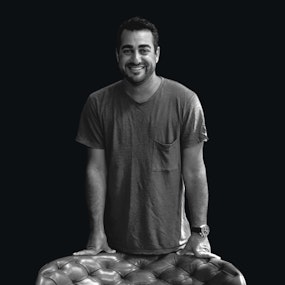
Dean Kuchel
King of Digital Nomads
Dean Kuchel is a 9 years digital nomad, who traveled to 100+ countries. He is an ambassador to the digital nomad lifestyle, a public speaker, founder of Digital Nomads Israel, founder of United Nomads, and a consultant for various businesses, and governmental bodies to promote remote work, the digital nomad lifestyle and the future of work.
Known as the “King of Digital Nomads”, Dean Kuchel has been working remotely from over 100 countries around the world before the term “digital nomad” was even a thought. Over the last 10 years, he has empowered 1000s of people to choose a life of freedom through founding Digital Nomads Israel, his captivating keynotes, government & business collaborations, advocacy and mentorship.




























